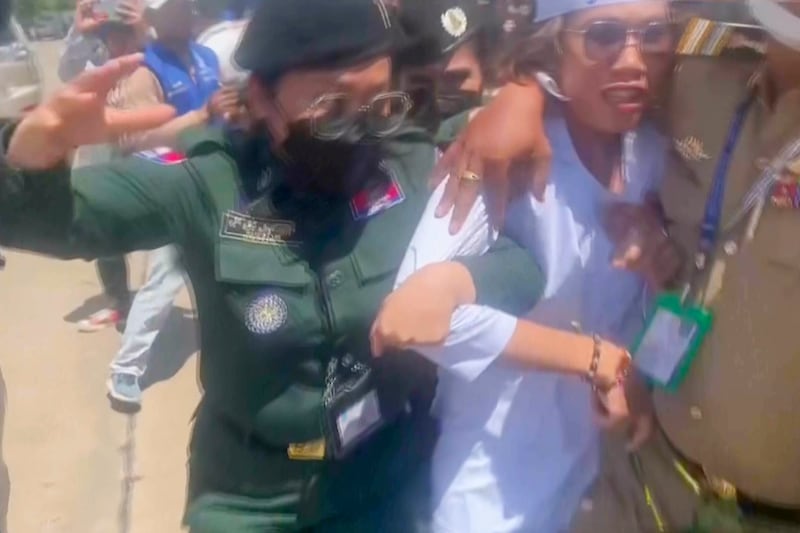Lawyers and family members of five imprisoned environmental activists said the activists are still being held at separate remote prisons, making it time-consuming and costly to visit them.
The mother of Phoun Keo Raksmey told Radio Free Asia that she visited her daughter at Pursat Provincial Prison on Aug. 9 and found her to be much thinner compared to a month ago. She complained of cramped and isolated living conditions, no electricity and bad food.
“It is difficult to eat there and everything is much more expensive,” said Raksmey’s mother, Kong Manit, who said it costs her between US$100 and US$200 to travel to Pursat.
Several relatives told RFA they have been working with lawyers to submit transfer requests in writing to have the five activists from the Mother Nature group moved on humanitarian grounds to Prey Sar Prison in Phnom Penh.
Such a move would make it easier to meet with the lawyer who is defending the activists and is organizing their appeal.
“They are far away, and we need to meet them one by one,” the lawyer, Sam Chamroeun, told RFA.

A Phnom Penh Municipal Court judge sentenced a total of 10 activists in the case to between six and eight years in prison after they were convicted on July 2 for conspiring against the state.
Five of the 10 defendants are either in hiding or live outside of the country and were tried in absentia, including the Khmer-speaking founder of the Mother Nature group, Spanish environmentalist Alejandro Gonzalez-Davidson, who was deported from Cambodia in 2015.
Intended to demoralize
The other five were immediately transported from Phnom Penh to different prisons – some of them in remote provinces.
Raksmey is imprisoned at the foot of the Cardamom Mountains in Pursat, which is about 220 km (136 miles) from Phnom Penh.
Long Kunthea is being held in northern Preah Vihear province near the Thai border. Thon Ratha is at Trapeang Thlong Prison in Tbong Khmum province near Vietnam.
Ly Chandaravuth is imprisoned in Kandal Provincial Prison in Takhmau, just a few kilometers south of Phnom Penh, while Yim Leang Hy is being held in Kampong Speu Provincial Prison, about 52 km (32 miles) west of the capital.
Hong Srey Mao, the wife of Yim Leang Hy, said she just delivered their second child and hasn’t been able to visit her husband. Their 5-year-old often asks about his father’s whereabouts.
“I am sad and lack harmony because the government arrested my husband unjustly,” she said.
The government has sent other high-profile prisoners to remote locations, including Cambodian-American lawyer Theary Seng, who was convicted of treason in 2022 in another case that was criticized as politically motivated. She was held at first at Preah Vihear Prison before her eventual transfer to Prey Sar.
RELATED STORIES
[ Cambodian prison officials stop family from visiting environmental activistsOpens in new window ]
[ Why environmental activism survives Cambodia’s destruction of civil societyOpens in new window ]
[ 10 Cambodian environmental activists sentenced to prisonOpens in new window ]
[ Prosecutors play videos of environmental activists at Cambodian trialOpens in new window ]
Sending the five activists to different prisons was intended to demoralize them and their families, said Ny Sokha, the president of human rights group Adhoc.
The charges against the environmental activists – first filed in 2021 – were also widely condemned as politically motivated. The case stemmed from several instances of activism, including the 2021 filming of sewage draining into the Tonle Sap River in front of Phnom Penh's Royal Palace.
Three of the 10 were also convicted of insulting King Norodom Sihamoni.
The activists can submit a transfer request to the Ministry of Interior, according to prisons spokesman Nuth Savana. In the meantime, inspectors will be sent to Pursat to look into conditions at the prison there, he told RFA.
Translated by Yun Samean. Edited by Matt Reed.
